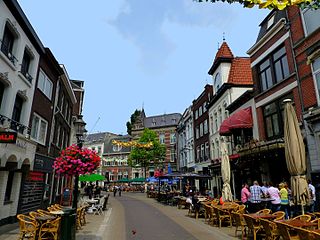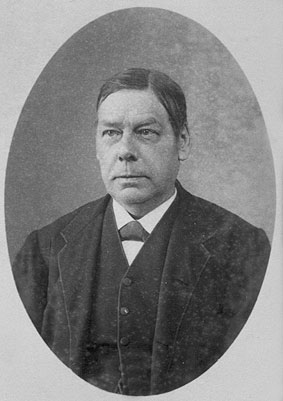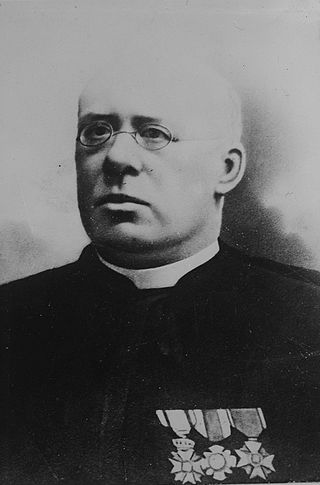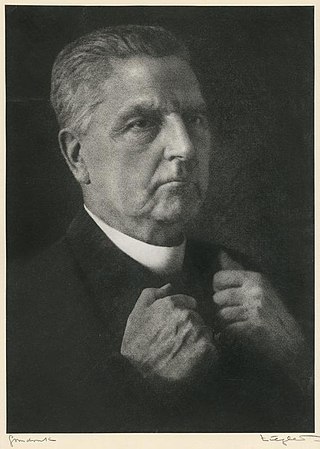This article needs additional citations for verification .(February 2019) |

(photo by Franz Ziegler)


Wilhelmus Hubertus (Wiel) Nolens (Venlo, 7 September 1860 - The Hague, 27 August 1931) was a Dutch politician and a Roman Catholic priest.
This article needs additional citations for verification .(February 2019) |



Wilhelmus Hubertus (Wiel) Nolens (Venlo, 7 September 1860 - The Hague, 27 August 1931) was a Dutch politician and a Roman Catholic priest.
Willem Hubert Nolens was born to Martin Nolens, a tanner, and Hermina Hubertina Linskens. He studied philosophy at the Bisschoppelijk College of Rolduc (1874–1880), theology at Roermond Seminary (1880–1884) and jurisprudence and law at Utrecht University (1887–1890). He was ordained a Roman Catholic priest in 1887 and taught economics and moral philosophy at Rolduc. In 1896 he was elected to the Dutch House of Representatives. He joined the club of Roman Catholic members of parliament of which fellow priest Herman Schaepman was the chairman.
In 1904, a year after Schaepman's death, Nolens and other Roman Catholic politicians founded the General League of Roman Catholic Caucuses. He was a democratically minded politician who strove to better the fate of the working class and favoured better social security. Like Schaepman before him, this brought him into conflict with the conservative Catholics in parliament. In 1910 Nolens became the fractievoorzitter of the General League in parliament, a position he would retain until his death in 1931. In 1918 he became formateur of a cabinet. Although in Dutch political discourse becoming formateur normally leads to the office of Prime Minister, Nolens could not accept the position because of his clerical status. Instead Charles Ruijs de Beerenbrouck was named the first Roman Catholic Prime Minister in Dutch history and he chaired the cabinet Nolens had formed. In 1926 the loose organisation of the General League was further tightened and it was renamed to Roman Catholic State Party. When young Catholic intellectuals drifted towards right-wing extremism at the end of the 1920s Nolens faced increasing criticism. In 1930 the National Socialist Catholic poet Gerard Wijdeveld fiercely attacked Nolens in his poem De Droom van Nolens (Nolens' Dream) because of his perceived soft stance on freedom of religion in the Dutch East Indies.
Nolens was an influential politician in Dutch politics throughout the 1920s and 1930s as the Roman Catholic State Party was the largest party in Dutch parliament at the time. He was immensely popular amongst the miners in his native Limburg for they owed much of their improved working and living conditions to his support for social reforms. The night before his funeral street lighting in Venlo was covered as a sign of mourning. Ten thousand people attended the funeral next day.

Jozef Maria Laurens Theo "Jo" Cals was a Dutch politician of the Catholic People's Party (KVP) and jurist who served as Prime Minister of the Netherlands from 14 April 1965 until 22 November 1966.

Venlo ( ) is a city and municipality in southeastern Netherlands, close to the border with Germany. It is situated in the province of Limburg. The municipality of Venlo counted 101,578 inhabitants as of January 2019.

The prime minister of Belgium or the premier of Belgium is the head of the federal government of Belgium, and the most powerful person in Belgian politics.

The prime minister of the Netherlands is the head of the executive branch of the Government of the Netherlands. Although the monarch is the de jure head of government, the prime minister de facto occupies this role as the officeholder chairs the Council of Ministers and coordinates its policy with the rest of the cabinet. In his role as head of government, the prime minister also represents the Netherlands in the European Council. The current prime minister, Dick Schoof, has been in the position since 2 July 2024, with his cabinet being sworn in on the same day.

The cabinet of the Netherlands is the main executive body of the Netherlands. The current cabinet of the Netherlands is the Schoof cabinet, which has been in power since 2 July 2024. It is headed by Prime Minister Dick Schoof.

The Free-thinking Democratic League was a progressive liberal political party in the Netherlands. Established in 1901, it played a relatively large role in Dutch politics, supplying one Prime Minister, Wim Schermerhorn. The League is a predecessor of two of the major Dutch political parties, the conservative liberal People's Party for Freedom and Democracy (VVD) and the social democratic Labour Party (PvdA). The social liberal Democrats 66 also claims that it and the VDB are ideologically connected.

Louis Joseph Maria Beel was a Dutch politician of the Roman Catholic State Party (RKSP) and later co-founder of the Catholic People's Party (KVP) and jurist who served as Prime Minister of the Netherlands from 3 July 1946 until 7 August 1948 and from 22 December 1958 until 19 May 1959.

The De Jong cabinet was the executive branch of the Dutch Government from 5 April 1967 until 6 July 1971. The cabinet was formed by the christian-democratic Catholic People's Party (KVP), Anti-Revolutionary Party (ARP) and Christian Historical Union (CHU) and the conservative-liberal People's Party for Freedom and Democracy (VVD) after the election of 1967. The cabinet was a centre-right coalition and had a substantial majority in the House of Representatives with prominent Catholic politician Piet de Jong the Minister of Defence in the previous cabinet serving as Prime Minister. Prominent Liberal politician Johan Witteveen a former Minister of Finances served as Deputy Prime Minister and returned as Minister of Finance, prominent Protestant politician Joop Bakker the Minister of Economic Affairs in the previous cabinet served as Deputy Prime Minister, Minister of Transport and Water Management and was given the portfolio of Suriname and Netherlands Antilles Affairs.

The Roman Catholic State Party was a Catholic Christian democratic political party in the Netherlands. The party was founded in 1926 as a continuation of the General League of Roman Catholic Caucuses. During its entire existence, the party was in government. In 1945 the party became the Catholic People's Party (KVP).

The General League of Roman Catholic Electoral Associations, informally called the General League, was a Catholic political party in the Netherlands. It existed from 1904 to 1926, when it was succeeded by the Roman Catholic State Party. It is one of the ancestors of today's Christian Democratic Appeal.

Joannes "Jan" Kappeyne van de Coppello was a Dutch liberal politician who served as Prime Minister of the Netherlands from 1877 to 1879.

Petrus Josephus Mattheus "Piet" Aalberse Sr. was a Dutch politician of the General League of Roman Catholic Caucuses, later the Roman Catholic State Party (RKSP) and later co-founder of the Catholic People's Party (KVP) and jurist. He was granted the honorary title of Minister of State on 31 December 1934.

This article gives an overview of Christian democracy in the Netherlands, which is also called confessionalism, including political Catholicism and Protestantism. It is limited to Christian democratic parties with substantial support, mainly proved by having had a representation in parliament. The sign ⇒ means a reference to another party in that scheme.

Herman Johannes Aloysius Maria Schaepman was a Dutch priest, politician and poet.

Jan Harte van Tecklenburg or Joannes Josephus Ignatius Harte was a Dutch politician.

Charles Joseph Ignace Marie Welter was a Dutch politician and diplomat of the General League of Roman Catholic Caucuses, later the Roman Catholic State Party (RKSP), the Catholic People's Party (KVP) and founder of Catholic National Party (KNP) before rejoining the Catholic People's Party and nonprofit director.

A process of cabinet formation took place following the Dutch general election of 14 and 27 June 1901. The formation resulted in the Kuyper cabinet on 1 August 1901. It was the second coalition cabinet, because it consisted of Catholics and the Anti-Revolutionary Party (ARP). It was further supported by the Free Anti-Revolutionary Party (VAR) and the Christian Historical Voters' League (CHK).
A process of cabinet formation took place following the Dutch general election of 6 and 20 March 1888. The formation resulted in the Mackay cabinet on 21 April 1888. It was the first coalition cabinet, because it consisted of Catholics and the Anti-Revolutionary Party (ARP).

A cabinet formation took place in Netherlands after the general election of 3 July 1918. The formation led to the swearing-in of the first Ruijs de Beerenbrouck cabinet on 9 September 1918, compromising the Roman Catholic State Party (RKSP), the Anti-Revolutionary Party (ARP) and the Christian Historical Union (CHU).

The Nolens doctrine is a principle in politics of the Netherlands that Catholics should only collaborate with the Social Democratic Workers' Party (SDAP) in the cabinet in cases of "utmost necessity."